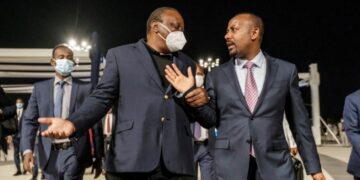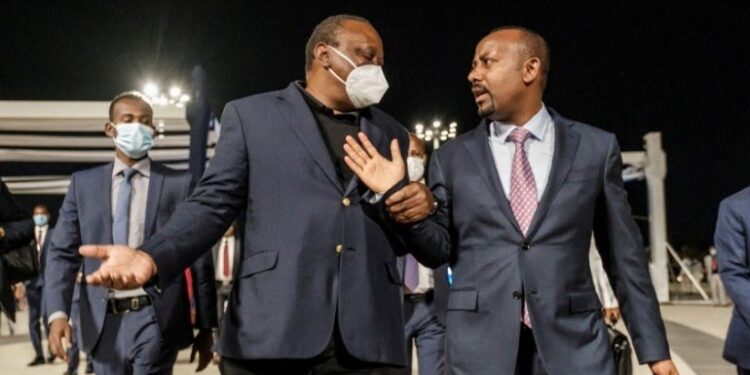By John Ikani
Kenya’s President, Uhuru Kenyatta on Sunday arrived Ethiopia amid growing international and regional efforts for a cessation of hostilities in the country’s war with rebel group Tigray People’s Liberation Front (TPLF).
More than 12 months of fighting between federal troops and Tigrayan forces have cost thousands of lives and displaced more than two million people, with hundreds of thousands facing famine-like conditions.
Kenyatta, who has previously participated in regional mediation efforts, landed in Ethiopia on a surprise one-day visit, with Abiy posting photos of the pair on Twitter.
State House Kenya said on Twitter that Kenyatta had held private talks with Abiy and Ethiopian President Sahle-Work Zewde.
Earlier this month, Kenyatta had called on Ethiopia’s warring sides to lay down their arms and find a path to peace.
“The fighting must stop!” he had said in a statement, decrying the “particularly disturbing” lack of dialogue.
Kenya has increased security along its borders amid fears of a wave of Ethiopians fleeing the war as one of the world’s worst humanitarian crises spreads.
Kenyatta’s visit comes days after African Union (AU) envoy Olusegun Obasanjo expressed hope dialogue can end the conflict but warned “such talks cannot deliver” without an immediate ceasefire.
Obasanjo left Ethiopia on Thursday after meeting Prime Minister Abiy Ahmed and the leadership of the Tigray People’s Liberation Front (TPLF) rebel group, while United States special envoy Jeffrey Feltman also visited the country last week for talks.
The envoy in a statement on Sunday said he was “optimistic that common ground towards a peaceful resolution of the conflict can be secured”.
But with fighting intensifying in recent weeks, the former Nigerian president and AU special envoy for the Horn of Africa warned that “such talks cannot deliver in an environment of escalated military hostilities”.
“I, therefore, appeal to the leadership of all sides to halt their military offensives. This will allow an opportunity for dialogue to continue to progress.”
His comments came ahead of a visit to three African nations by US Secretary of State Antony Blinken, who has backed Obasanjo’s efforts at mediation and threatened to impose sanctions on Abiy’s government and the TPLF unless they move forward on talks.
Ethiopia on Thursday laid out conditions for possible talks with the TPLF, including a halt to attacks and the withdrawal from the regions of Amhara and Afar bordering the northern Tigray region.
“There are conditions: First, stop your attacks. Secondly, leave the areas you have entered [Amhara and Afar]. Third, recognise the legitimacy of this government,” Ethiopia’s foreign ministry spokesman Dina Mufti told reporters on Thursday.
But TPLF spokesman Getachew Reda has previously said that pulling out from Amhara and Afar before talks begin is “an absolute non-starter”. The Tigrayan forces said earlier this month they had seized Kemise, 325km (200 miles) from the capital, Addis Ababa, and threatened to march on it.
The government, however, has accused the TPLF of exaggerating its territorial gains and insists that the conflict “is not coming to the capital”.
The TPLF is also demanding the end of what the United Nations describes as a de facto humanitarian blockade on Tigray, where hundreds of thousands of people are believed to be living in famine-like conditions.
Abiy sent troops into Tigray last November to topple the TPLF, a move he said came in response to rebel attacks on army camps.
Though the 2019 Nobel Peace laureate pledged a swift victory, by late June the TPLF had retaken most of Tigray before expanding into Amhara and Afar.




































